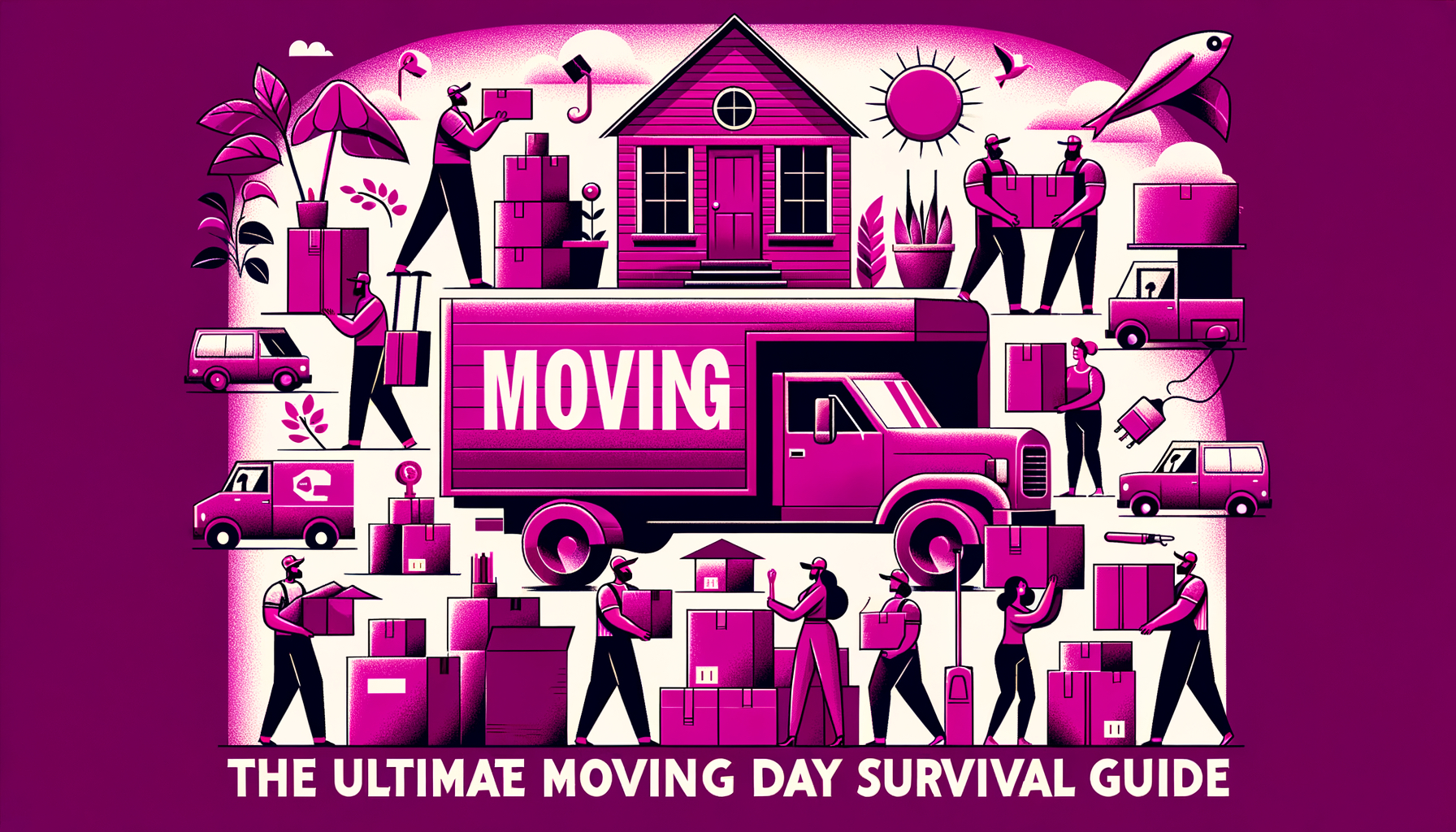 The Ultimate Moving Day Survival Guide
The Ultimate Moving Day Survival Guide
Moving day can be an incredibly stressful time for anyone. There are countless things to think about, prepare for, and manage, all while trying to stay organized and keep your belongings safe. That’s why we’ve put together this moving day tips guide to help you prepare for the big day, manage important documents and records, and pack like a pro. Whether you’re moving down the street or across the country, this guide has everything you need to ensure a smooth and stress-free move.
Preparing for the Big Day
Before diving into the actual move, it’s important to take some time to prepare. Here are some key things to consider:
Creating a Moving Timeline
Start by creating a moving process timeline that outlines all of the important tasks you need to complete before moving day. This can include tasks such as decluttering and organizing, packing, hiring movers, and notifying important parties of your move. Having a plan in place will help you stay on track and avoid any last-minute stress.
When creating your moving timeline, it’s important to consider the time of year you’ll be moving. If you’re moving during the summer months, for example, it’s important to book your movers well in advance as this is a popular time for moving. If you’re moving during the winter months, you may need to factor in extra time for potential weather delays.
Decluttering and Organizing
One of the most important tasks before a move is decluttering and organizing your belongings. This is the perfect time to get rid of anything you no longer need, want, or use. Consider donating items in good condition to charity or selling them online to make some extra cash. You’ll also want to organize your belongings by room, which will make packing and unpacking much easier.
When decluttering, it’s important to be ruthless. Ask yourself if you’ve used an item in the past year and if not, consider getting rid of it. This will not only make your move easier, but it will also help you start fresh in your new home.
Packing Tips and Tricks
When it comes to packing, there are a few key tips and tricks you should keep in mind. Invest in sturdy boxes and use packing paper or bubble wrap to protect fragile items. Always label your boxes with the contents and the room they belong in, which will make unpacking a breeze. And don’t forget to pack a “first night” box with essentials like bedding, toiletries, and a change of clothes.
When packing fragile items, it’s important to use plenty of padding. This can include packing peanuts, bubble wrap, or even towels and blankets. You’ll also want to make sure that any boxes containing fragile items are clearly labeled as such and are stacked on top of heavier, sturdier boxes.
Gathering Moving Essentials
Make sure you have all the essential moving supplies you need, such as boxes, tape, packing paper, bubble wrap, and markers. You might also want to consider investing in furniture sliders to make moving heavy items a bit easier.
When it comes to boxes, it’s important to have a variety of sizes on hand. This will make packing much easier as you’ll be able to fit items of different shapes and sizes into boxes that are the right size.
Hiring Professional Movers vs. DIY Moving
Finally, you’ll need to decide whether to hire a professional moving company or do the move yourself. While a DIY move can save you some money, professional movers can take a lot of the hassle and stress out of the process. Consider your budget, timeline, and the amount of belongings you have when making this decision. If you do decide to move by yourself, you’ll want to rent a moving truck for the day.
If you do decide to hire professional movers, it’s important to do your research. Look for movers with good reviews and a solid reputation. You’ll also want to make sure that they’re licensed and insured.
Ultimately, whether you decide to hire professional movers for that extra moving day help or do the move yourself, the most important thing is to stay organized and have a plan in place. This will help ensure that your move goes as smoothly as possible.
Important Documents and Records
When you’re moving, it’s easy to overlook important documents and records. Here are some tasks to keep in mind:
Updating Your Address
One of the most important things to remember when you’re moving is to update your address. This can be a time-consuming task, but it’s essential to ensure that your mail gets forwarded to your new address without any issues. Make sure you update your address with all relevant parties, including your bank, employer, and any subscription or service providers. You should also update your address with the post office to ensure that your mail gets forwarded to your new address.
It’s also a good idea to let your friends and family know about your move so they can update their address books and send any mail or packages to your new address. This will ensure that you don’t miss out on any important correspondence.
Transferring Utilities and Services
Another important task to remember when you’re moving is to transfer or cancel all of your utilities and services. This includes electricity, gas, water, internet, and cable. Be sure to set up new services at your new home as well, which will ensure that everything is up and running when you arrive.
When you’re transferring utilities, make sure you schedule the transfer for a few days before you move in. This will ensure that you have electricity, gas, and water when you arrive. You should also make sure that your internet and cable services are set up before you move in, so you can start enjoying your new home right away.
Handling Medical and School Records
If you have children, one of the most important tasks to remember when you’re moving is to transfer their school records to their new school. This will ensure that they don’t miss out on any important coursework or activities. You’ll also want to make sure you have copies of all important medical records and prescriptions, which can be provided to your new healthcare provider.
When you’re transferring medical records, make sure you give your healthcare provider enough notice so they can transfer your records to your new provider. This will ensure that you don’t miss out on any important medical information or prescriptions.
Notifying Important Parties
Finally, you’ll want to notify any important parties of your move. This includes your employer, doctor, insurance provider, and any government agencies as needed. This will ensure that you don’t miss out on any important updates or information after your move.
When you’re notifying important parties, make sure you give them enough notice so they can update their records and provide you with any necessary information. You should also make sure you update your own records with your new address and contact information.
By following these tips, you can ensure that your move goes smoothly and that you don’t overlook any important documents or records.
Moving Day Essentials
Moving day can be a stressful time, but with a bit of preparation, you can make the process go smoothly. Here are some tips to help you stay organized and manage the chaos:
Packing a First Night Box
When you arrive at your new home, you’ll likely be tired and ready to relax. But before you can do that, you need to unpack and get settled.
To make this process easier, pack a “first night” box with all the essentials you’ll need for your first night in your new home. This might include bedding, toiletries, a change of clothes, and some snacks. Make sure this box is easily accessible on moving day so you can find it quickly.
Preparing an Emergency Kit
Even with the best planning, unexpected things can happen on moving day. To be prepared for any situation, put together an emergency kit with items like a first aid kit, a flashlight, and some basic tools. Keep this kit with you at all times during the move.
Keeping Valuables Safe
During a move, it’s important to keep your valuable items safe. Make sure you keep any jewelry, important documents, and other valuable items with you at all times. Don’t pack them in a box that will be loaded onto the moving truck – keep them in your car or another safe place where you can keep an eye on them.
Managing Food and Perishables
If you’re moving a long distance, it’s important to think about how you’ll handle any food and perishable items you have. Depending on how far you’re moving, you may need to dispose of or donate these items before you leave. If you’re only moving a short distance, consider packing them in a cooler with ice packs to keep them fresh during transit. Remember to label the cooler clearly so you can find it easily when you arrive at your new home.
Conclusion
By following these tips, you can make your move less stressful and more organized. Remember to take breaks when you need them, stay hydrated, and ask for help if you need it. With a bit of planning and preparation, you’ll be settled into your new home in no time!
